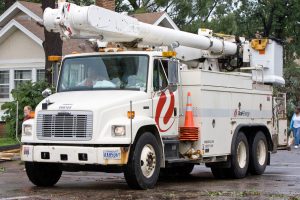 Minneapolis-based public utility Xcel Energy announced that it will be completely carbon-free by 2050. California’s SB100, which passed earlier this year, sets a similar goal for the state by 2045, but Xcel is the first utility in the nation to set a goal this bold. Xcel has already taken steps to become more sustainable. In 2017, 40% of Xcel’s electricity generation was carbon-free, with much of that coming from wind and nuclear power. According to its website, Xcel intends to double the wind power it generates by 2022 and plans to retire 40% of its coal capacity by 2027.
Minneapolis-based public utility Xcel Energy announced that it will be completely carbon-free by 2050. California’s SB100, which passed earlier this year, sets a similar goal for the state by 2045, but Xcel is the first utility in the nation to set a goal this bold. Xcel has already taken steps to become more sustainable. In 2017, 40% of Xcel’s electricity generation was carbon-free, with much of that coming from wind and nuclear power. According to its website, Xcel intends to double the wind power it generates by 2022 and plans to retire 40% of its coal capacity by 2027.
Xcel is one of many private industries that have made public announcements of their commitment to go carbon-free or 100% renewable. That these companies have committed to this goal in the absence of any overarching federal policy, speaks to their perception of public demand. As the industry continues to transition in response to public pressure, it is likely that policymakers will eventually follow suit and adopt legislation imposing carbon limits on the energy sector. Companies that plan for the future with this in mind will be well positioned financially should regulations be imposed.
Bryan Hannegan, President and CEO of Holy Cross Energy, a rural electric cooperative serving western Colorado, including the Aspen Institute, stated “As a wholesale customer of Xcel Energy in Colorado, we’re very excited to see this announcement, which builds upon our own announcement last September of a 70% greenhouse gas reduction goal by 2030.”
Unlike other private companies that have committed to going 100% renewable, Xcel’s commitment to going carbon-free depends on developing and deploying advanced technologies like carbon capture and sequestration (CCS). While not yet cost effective or commercially available, this technology, according to Xcel, will be necessary to reach their carbon-free goal by 2050. Federal investments in CCS technology have largely been flat, but private investors have already developed and demonstrated this CCS technology at a natural gas plant in Houston, which “capture(s) all its emissions effectively at zero extra cost.”
Companies like Xcel have to plan for the long term. When they make decisions, such as building or shutting down power plants, they do so considering their future existence and not just the current political climate. Decisions like going carbon-free by 2050 keep utility companies ahead in the long-term curve that is leading towards reduced emissions, new technologies, and a cleaner energy future.
To restate the obvious, there is enough cheap wind and solar resources around the United States to amply supply enough electrons to meet our 2050 needs. The challenge, as it… Read more »
The carbon-free option for Xcel in the upper Midwest may be relatively easy because of the nuclear plants that Xcel owns. Nuclear plants can be coupled with heat storage systems… Read more »
Xcel Energy is a diversified utility with substantial natural gas distribution interests. As long as Xcel sticks to decarbonizing electricity, I’m not too concerned; except for the fact that resultant… Read more »
Thanks for the NRDC agreement reference. It is certainly a dance around the idea that utilities, used to being the only providers of electricity, will have to find new business… Read more »
Xcel has two service areas–Minnesota and Colorado. Carbon capture and sequestration is only viable in Colorado. The granite Canadian shield covers the surface of Northern Minnesota. By the time one reaches the Iowa boarder, the Canadian… Read more »
CCS will certainly be viable before 2050. Inventys Thermal Technologies (one of our portfolio companies) has a carbon capture system that utilizes solid sorbents instead of liquid solvents and is… Read more »